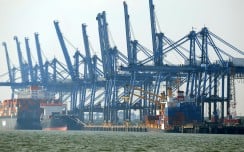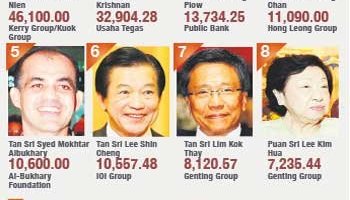
 |
| Market impact: The reaction of investors following the past two GEs is an example of how investors value certainty and how Bursa will be affected in the event of a Pakatan victory this time around. |
Policy directions from political pledges have business and economic consequences.
EVER since Parliament was dissolved ahead of polling for the 14th general election (GE14), the combustible campaigning period has been mirrored by the volatile stock market.
The FBM KLCI hit an all-time high of 1,895 points on April 19, just a week after the dissolution of Parliament, but has since tracked lower as election day nears.
With the market edgy prior to polling day, UOB KayHian in a note on the election says that the election factor is a short-term sway phenomenon.
“While unexpected election results can be a significant market sway factor in the near term, such market reactions have been short-lived in the past.
“For example, when the Barisan Nasional’s control of parliamentary seats surprisingly slipped below two-thirds during GE12, the FBM KLCI plunged by as much as 9.5% in a day, triggering a trading circuit breaker at the worst level,” it says.
The research house notes that the FBM KLCI recouped most of the losses within a couple of weeks, once investors were assured of the continuity of political stability and business-friendly policies.
Both Barisan and Pakatan Harapan are mindful of maintaining business-friendly policies, it says. “Pakatan has on various occasions highlighted that it will generally uphold the sanctity of government contracts should it win the election. Eventually, equity markets will be dictated by external and domestic economic fundamentals and liquidity considerations.”
Market volatility and fierce campaigning do go hand-in-hand, given the uncertainties the outcome of the GE will bear on the stock market and businesses. Experts have said that the direction of the ringgit and also the economy will be determined after polling day as the country charts its political, along with economic and business, direction for the next five years.
“If Barisan wins, it will be seen as a vote for continuity. It will be business as usual, given the various plans and policies the Barisan government has laid out in the past and for the future,” says an economist.
“For businessmen, that mindset of what to expect is important for future planning and direction and they will like not to have any anxiety on what to expect in the future.”
The economic and business direction
The Barisan government, which has been in power since independence, has a track record of what it has done and will do for the country when it comes to business and economic planning.
The various Malaysia plans, budgets and policies announced over the decades have plotted the economic direction of the country. But in recent times, some will look at its manifesto as to the future policy direction the country will adopt should it retain power.
Policy promises are something more voters pay attention to these days, and judging by the manifestos of Barisan and even the Opposition, their documents are detailed with measures they will carry out in the impending five years.
For the Barisan government, the launch of its manifesto was done with much pomp, with it even detailing how it has fulfilled 99.4% of its 2013 manifesto pledges. Much of the focus of its latest manifesto is on the people, in order to lift their incomes and well-being.
These promises include raising the minimum wage in phases to at least RM1,500 within five years to setting up a Fair Works Commission to ensure that the salary levels of private-sector workers are more equitable.
BR1M recipients who enrol in higher education institutes will, meanwhile, receive a one-off assistance of RM1,500 plus there are a slew of measures for the country’s Felda settlers and their family members who are spread out over 317 settlements in 54 parliamentary seats nationwide in the manifesto.
Barisan is also promising to create three million jobs, and among the measures promised to help achieve this is by speeding up the development of the Malaysian Vision Valley, a 150,000ha area that is projected to create 1.3 million job opportunities.
On housing, the manifesto pledges a number of measures including setting up a special bank to facilitate loans for affordable and low-cost housing priced RM300,000 and below.
In addition, tax incentives or development funds will be provided to encourage banks and housing developers to offer rent-to-own schemes.
CIMB Research in a note on Barisan manifesto points out the key pledges which include low-income households, Felda settlers, females, the elderly and farmers.
It points out that the key promises include a top-up on the BR1M payments, raising the minimum wage to RM1,500 within five years, potential revisions in personal and corporate income taxes, expansion of affordable housing aid, special incentives and funds for Felda settlers, and subsidised public transport passes, broadband and other consumer goods/services.
It says that the additional BR1M payments will amount to at least RM3.71bil or 0.25% of gross domestic product (GDP) in 2018, which comes on top of the prior week’s civil servant pay hikes of RM1.46bil effective July 1.
“New spending commitments imply that the budget deficit is unlikely to improve significantly from the target of 2.8% of GDP despite windfalls from higher oil prices and GDP growth,” CIMB says.
It believes the market is expecting the ruling coalition, Barisan, to win the majority of the Parliament seats.
“We view Barisan’s widely expected win as neutral to positive for the market. The stock market’s performance post-election will depend on the degree of selling pressure during the campaigning period and the poll results.”
What the additional cash injection to households will mean is a lift in consumer spending. Consumption is a big driver of the economy and the BR1M payments have been one of the reasons for the steady performance of domestic demand.
“Furthermore, the economy will get a lift from the lift-off from projects that have already been identified for construction. The MRT, the high-speed rail between Kuala Lumpur and Singapore, and the construction of Bandar Malaysia will be some of the projects that will lift the construction sector and also the economy,” an economist says.
During the years when pledges from the past Barisan manifesto were being carried out, the economy had its ups and downs given the crunch felt by the collapse in crude oil prices.
The GDP, nonetheless, during the past five years has been positive, given the rollout of projects during that period. Growth came in at 5.9% in 2017 and was 4.2% in 2016, 5% in 2015, 6% in 2014 and 4.7% in 2013.
There have been concerns that spending pledges contained in the manifesto would leave a hole in government finances, but indicators so far do not point to that being a problem.
The government’s debt-to-GDP ratio has fallen below the self-prescribed ceiling of 55% to 51% and going by what the data shows in the first quarter, government finances seem to be holding up.
Nomura in a note says that Malaysia’s fiscal deficit was RM11.2bil in the first quarter of 2018, or 3.3% of GDP, which was below its forecast of 6%.
“This is smaller than any of the first-quarter deficits in the previous five years,” it says.
Nomura says revenue collection appears to have exceeded expectations significantly, surging by 16.5% year-on-year in the first quarter and was likely boosted by higher oil prices and possibly some lagged effect from strong GDP growth last year.
“However, more surprisingly, spending appears to have been quite restrained, falling by 2% despite the GE on May 9. Spending details have yet to be released but such restraint may prove temporary with the government likely concentrating the use of its fiscal firepower closer to election day,” it says.
“This likely explains the government’s confidence in maintaining its 2018 deficit target of 2.8% of GDP despite announcements of additional cash handouts around the election.
“While we continue to expect government spending to spike in the second quarter, the surprising outturn in the first quarter suggests that fiscal tightening in the second half may be less severe than we currently forecast,” it says. By Jagdev Singh Sidhu The Star
Election a short-term market sway phenomenon
THE consensus is for the Barisan Nasional to win the upcoming general election (GE) to be held next Wednesday. But what if Pakatan Harapan were to win?
The immediate implications of a Pakatan win will be on the financial markets. The other implication is the impact in the mid to long-term of a Pakatan win on the economy.
The financial markets
There is no precedence for a win by the parliamentary Opposition in Malaysian history, and because investors prefer certainty, the financial markets are sure to be volatile.
The reaction of investors following the past two GEs is example of how investors value certainty and how Bursa Malaysia will be affected in the event of a Pakatan victory this time around.
The local bourse’s benchmark, the FBM KLCI, slipped 9.5% on the first day of trading after the 2008 election, which was held on a Saturday. This was after Barisan lost its two-thirds majority in Parliament for the first time and also lost control of five state legislatures.
In 2013, the stock market fell the week before the election on speculation of an Opposition victory at the federal level. That was the year when many felt sure that Barisan would lose. The Barisan clung on to power but lost the popular vote. The stock market rallied.
While there certainly was a reaction by investors, it must be noted that the Malaysian financial markets, including the stock market, do not act in isolation.
In 2008, fund flows were also influenced by broader movements in the global markets made volatile by the global financial crisis.
“Don’t forget that news flow from the US markets was bad on a daily basis,” a fund manager with an emerging-market portfolio points out.
Shortly after the 2008 election, Bear Stearns Companies Inc, an investment bank, was taken over by another investment bank, JPMorgan Chase & Co, in an operation largely directed by the US Federal Reserve (Fed), which was afraid of what the failure of a Wall Street institution would do to market confidence.
The fund manager tells StarBizWeek that investors just took the opportunity to offload riskier emerging-market assets following the outcome of the election.
“It’s normal to point to market swings either way to domestic factors but in reality, for the index to move, institutional shareholders must react and they rarely do so on just domestic factors, especially in that period of time,” he says.
The same reasoning goes for currency movements. The ringgit’s weakness in the past month has been blamed on investor jitters prior to the upcoming election, but pressure on the currency is really coming from rising US bond yields.
Investors are repositioning on market speculation of four instead of three US interest rate hikes and this has had an impact on emerging-market currencies as well as equity markets.
Although the Fed left the benchmark interest rate unchanged in a recent meeting, officials say that inflation is close to the 2% target. The market expects the Fed to raise the federal funds rate a second time in June when it next meets.
How this works is that investors are anticipating that new US government bonds will now be issued with a higher coupon rate, which is the interest that is paid out annually on the bonds because of the higher interest rates. Also, because of the anticipation, the earlier issued bonds, with a lower coupon rate, will now be traded at a lower price, and because there is an inverse relationship between bond prices and yields, there is a rise in bond yields.
This is why the benchmark 10-year US Treasuries yield is now higher, because the price has dropped, causing US bond yields to narrow against the yields of similar-tenor bonds of foreign government issuers.
For example, the yields between the 10-year Malaysian Government Securities and the 10-year Treasuries have narrowed, making Treasuries – because of its safe-haven status and underlying currency strength – a more attractive asset.
An interest rate hike also means that inflationary pressure is picking up because of economic growth and that will attract investors too.
The steady US economic outlook, US dollar strength and safe-haven status at a time of much geopolitical uncertainty are also attractive factors. Currency strategists point to US dollar movements as more important when taking into account the US dollar/ringgit pairing. The decisions of US policymakers as well as other external factors such as trade will have more weight on the ringgit’s direction rather than purely domestic factors.
Even the rising oil price has not been able to stem the weakness in the ringgit, and that is because of the investors repositioning rather than any inherent political risks.
However, a political analyst did say that without the higher oil price, the ringgit could have seen a steeper fall. “It could be that rising US bond yields is the reason for the ringgit’s weakness but I believe that political factors are at play too and that without the higher oil price, the ringgit would have fallen even more,” he says.
The economy
A Pakatan government will have to find a middle path in unravelling some of the more unpopular policies, while ensuring policy continuity and assuaging the concerns of investors.
Both Barisan and Pakatan claim to have the people’s welfare at heart, and both claim they want to alleviate the cost-of-living issue that Malaysians have been grappling with in recent years. The Pakatan coalition is also calling for the shaping of the nation’s economy in a fair and just manner.
The Pakatan promises must take into account the urgent need for the economy to move up the value chain. In one respect, a focus on high-end manufacturing will have a positive spillover effect, as such initiatives will attract high-end service jobs including banking and financial services as well as research and development opportunities.
The Pakatan manifesto launched in early March includes 10 promises to be implemented within 100 days of winning the election. Among the promises are the abolishment of the goods and services tax, reintroducing the petrol subsidy and increasing the minimum wage to RM1,500 by their first term in office.
Moody’s Investor Service analysts say in a report released yesterday that the implications on the country’s credit standing will be determined by the impact of the election results on existing government policies, with particular regard to fiscal consolidation and debt trend.
“Ahead of the election, Barisan and the key opposition, Pakatan, have both unveiled their manifestos and specific spending programmes targeted at key voter bases. These measures include raising the minimum wage, greater cash handouts and relief for Federal Land Development Authority settlers, among others,” they say.
The rating agency, which has maintained the country’s A3 credit profile with a “stable” outlook, says the impact of these programmes on the sovereign credit will depend on how they are funded and whether they have a negative effect by delaying the government’s ongoing efforts at fiscal consolidation.
“Economically, these programmes are likely to boost consumption over the near term but against the backdrop of Malaysia’s export-driven growth, the impact is not likely to be material and could be offset by inflation,” they note.
Another crucial promise is to launch detailed studies of multi-billion-ringgit projects awarded to foreign countries. This particular promise is likely aimed at China, which has become a major investor, if not the largest in recent years, with not only infrastructure projects but also property development.
Pakatan will have to tread carefully where reviewing contracts is concerned, as the sanctity of contracts is crucial to investor confidence.
“Any review of the mega-projects will have to be done in a tactful manner. Malaysia is not the United States, we don’t have the heft, so we need to be careful,” an analyst says.- by Fintan Ng The Star
Related posts:
Towering achievement: The Tun Razak
Exchange is one of the projects Ng says will be halted if the
Opposition wins the polls. — Bernama...


































